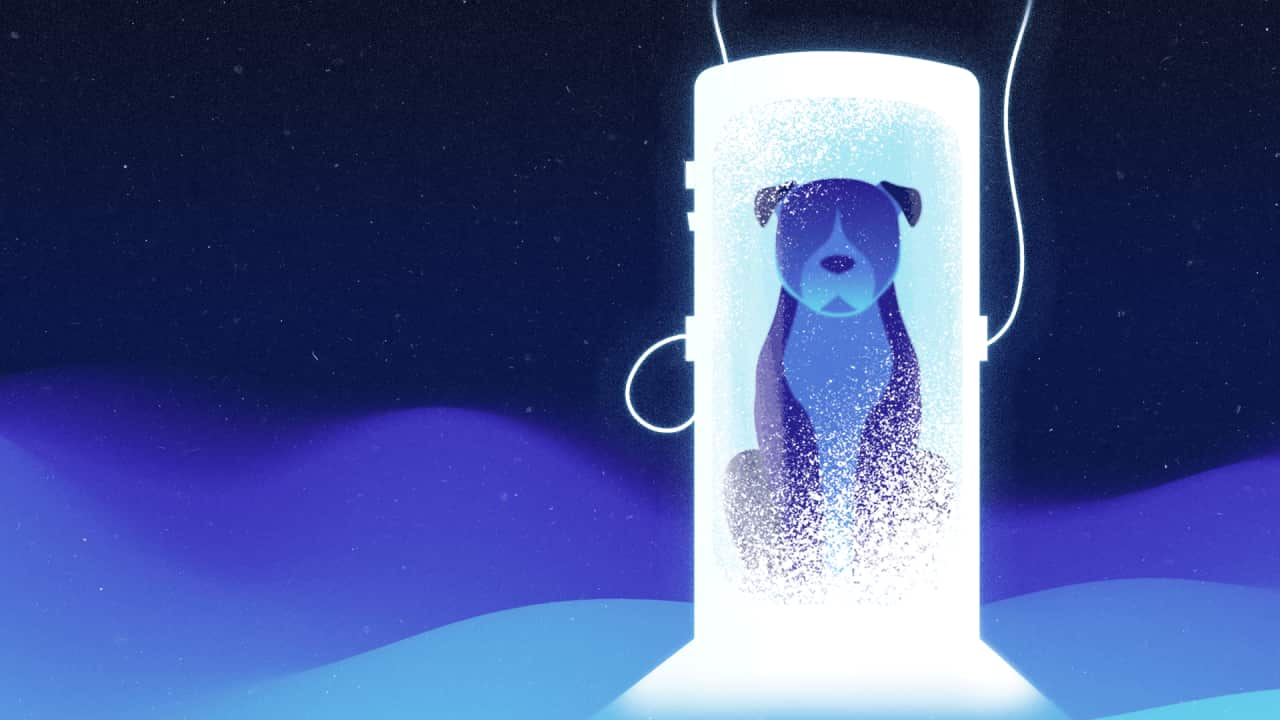Key points:
- Some pet owners are freezing their animals’ brains in a process known as cryonics.
- Those participating say they hope their pets will be brought back to life in the future.
- However, cryonics has attracted controversy and is considered by many to be a false science.
Bereaved pet owners are turning to cryonics, hoping technology will reunite them with their beloved companions in the future.
Renee (not her real name) has many fond memories of her two dogs.
“We took them everywhere. They were like our kids,” she said.

Renee was heartbroken when her dogs died. Source: SBS
“I just felt like I'd lost my whole family. That was devastating, just thinking, why can't I make them live forever?” she said.
It was that thought that led Renee to freeze her dogs’ brains.
Cryonics is the practice of preserving deceased bodies at extremely low temperatures, in the hope they may be resurrected in future.
The people that have had them frozen are taking a bet in the hope they will get reunited with their pet, somehow, in the future.Philip Rhoades
Proponents believe as long as the brain remains undamaged, there is a chance the person or animal may be brought back to life with their memories intact. Around the world, hundreds of people and their furry companions have entered a deep freeze.
However, cryonics has attracted controversy and is considered by many to be a false science.
Philip Rhoades, a former Australian biomedical researcher, has frozen 11 human brains and four dog brains so far – including Renee’s pets. He’s even received enquiries to freeze cats.
“The people that have had them frozen are taking a bet in the hope they will get reunited with their pet, somehow, in the future,” he said.
Mr Rhoades is the head of Neural Archives Foundation, a not-for-profit based in regional NSW that aims to preserve information in the brains of the deceased as a historical record.
He said some pet owners are banking on future technology that will allow their pet’s brain to be rejuvenated and placed into a new body.
He said this ‘body’ could be a biological body grown from the animal’s DNA, a synthetic body powered by electronics, or even a virtual body, for those who prefer to live in virtual reality.
“They want the good old days restored … they want a young, healthy pet but with all its memories.”

Pet owners are banking on future technology that will allow their pet’s brain to be rejuvenated and placed into a new body. Source: SBS
The brain is then taken to a commercial freezing facility, where it is frozen at almost -200C using liquid nitrogen.
The procedure costs $5,000 to $7,000, depending on which state of Australia you are in. It then costs an extra $10,000 to ensure the pet’s brain will be stored in perpetuity, or at least “until the end of the world”.
When you have just been through so much, your attachment is so much stronger, and you want them to never die.Renee*
For Renee, having her dogs’ brains preserved helped her cope with the grief after they died.
“You feel like there's some hope … back then, I felt like there was no hope,” she said.
“We wanted them to come back.”
Renee said she shared a special bond with her dogs that she rarely felt with other humans.
When she fell ill and was left bedridden, it was her dogs who stayed by her side.
“It was just amazing, the love and care from an animal that could sense how unwell I was and would not stop until I felt better,” she said.
“When you have just been through so much, your attachment is so much stronger, and you want them to never die.”
Renee is hopeful a day will come when she will be reunited with her beloved dogs.
“Words could not describe how it would feel seeing your loved ones again,” she said.
“I honestly believe it is possible.”
All of this is a bit of a gamble…there's no guarantee that it's going to work.Philip Rhoades
However, Mr Rhoades warned the future is still uncertain.
He estimates the technology to extract information from a frozen brain may be decades away and acknowledges that recovering an animal’s consciousness may not be possible.
“All of this is a bit of a gamble…there's no guarantee that it's going to work,” he said.
For those interested in undergoing a freeze with their four-legged friends, Australia’s cryonics industry is set to expand.
Southern Cryonics will be the first full-body cryonics facility in the southern hemisphere.
The centre, at the southern NSW town of Holbrook, is set to open its doors later this year, although it’s currently not accepting pets.
Mr Rhoades said there is potential for the industry to grow.
“If you've got the option of getting revived in the future, and living in a sort of young and rejuvenated form for as long as you want to, until you get truly bored with the universe … then why wouldn't you do it?” Mr Rhoades said.
“And … part of that option is to have a loved pet that was with you.”












